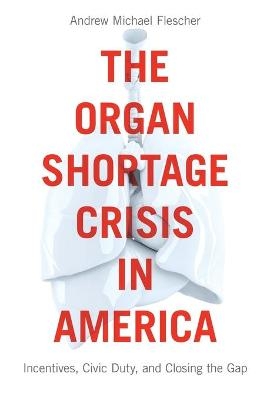
The Organ Shortage Crisis in America
Georgetown University Press (Verlag)
978-1-62616-544-1 (ISBN)
What is the most efficacious means of attracting prospective living kidney donors? Flescher, drawing on literature in the fields of moral psychology and economics, as well as on scores of interviews with living donors, suggests that inculcating a sense of altruism and civic duty is a more effective means of increasing donor participation than the resort to financial incentives. He encourages individuals to spend time with patients on dialysis in order to become acquainted with their plight and, as an alternative to lump-sum payments, consider innovative solutions that positively impact living donor participation that do not undermine the spirit of the National Organ Transplant Act of 1984. This book not only re-examines the important debate over whether to allow the sale of organs; it is also the first volume in the field to take a close look at alternative solutions to the organ shortage crisis.
Andrew Michael Flescher is a member of the core faculty, program in public health; professor of Family, Population, and Preventive Medicine; and professor of English at the State University of New York, Stony Brook. A member of the United Network for Organ Sharing Ethics Committee, he is the author of several books, including Moral Evil and Heroes, Saints, and Ordinary Morality, both from Georgetown University Press.
Acknowledgments
Introduction: The Organ Shortage Crisis in America Motivations for Giving, Especially of Precious GoodsCivic Duty A Word about the Audience and Purpose of This Book Organization Notes
1. The Case for Legalizing the Sale of Organs The Market as a Solution, If Not a Virtue Costs and Equity The "Tyranny of the Gift" Financial Incentives, Libertarianism, and the Black Market The Unique Case of Iran A Legal, Regulated Market for Organ Trade Notes
2. Ethical Concerns with Legalizing the Sale of Organs The Utility of Utility Selling Organs and the Impoverished Selling Organs and Public Safety Commodification Moving from Ethical to Pragmatic Considerations Notes
3. Organ Donation, Financial Motivation, and Civic Duty Paying It Forward Wolfenschiessen, Switzerland How Buying a Good Changes a GoodThe Difference between Lump-Sum Incentives and Compensatory MeasuresCivic Duty Notes
4. Living Donors and the Confluence of Altruism and Self-Regard Complex Human Motivations and the Myth of Unmotivated Altruism Living Donors and Living Donor Advocacy The Health Benefits of Living Donation Reflections of a Living Donor Advocate Notes
5. Making Altruism Practical Reducing Disincentives and Opening Doors to Virtue Paired Exchanges and Donor Chains Creating Incentives to Opt In Lost Wages and Travel Expenses Publicly Acknowledging Living Donors Nonmonetary Valuable, Comparable GoodsHelping Virtue Along Notes
Conclusion: Two to Four Hours of Your Life Notes
Index
About the Author
| Erscheinungsdatum | 10.05.2021 |
|---|---|
| Verlagsort | Washington, DC |
| Sprache | englisch |
| Maße | 152 x 229 mm |
| Gewicht | 286 g |
| Themenwelt | Medizin / Pharmazie ► Gesundheitswesen |
| Medizin / Pharmazie ► Medizinische Fachgebiete ► Medizinethik | |
| Studium ► Querschnittsbereiche ► Geschichte / Ethik der Medizin | |
| ISBN-10 | 1-62616-544-0 / 1626165440 |
| ISBN-13 | 978-1-62616-544-1 / 9781626165441 |
| Zustand | Neuware |
| Haben Sie eine Frage zum Produkt? |
aus dem Bereich


